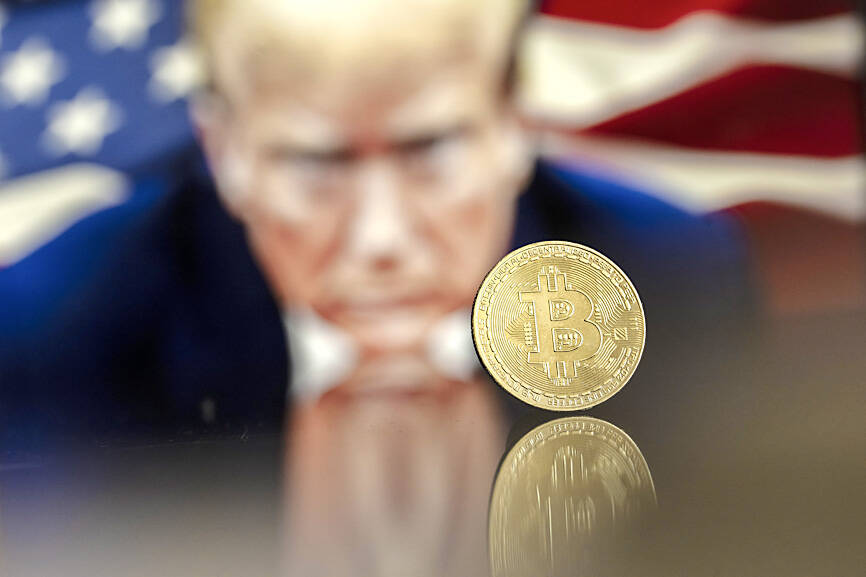Bitcoin rose to a record high on US president-elect Donald Trump’s support for digital assets and optimism about the upcoming inclusion of MicroStrategy Inc, an accumulator of the token, in a key US stock gauge.
The largest virtual currency rose more than 3 percent at one point yesterday in Asia to an unprecedented US$106,493, exceeding its previous peak on Dec. 5. The advance helped to boost sentiment in the wider crypto market.
Trump is moving toward creating a friendly regulatory backdrop for digital assets, undoing a crackdown imposed by US President Joe Biden’s outgoing administration. The Republican has also backed the idea of a strategic national bitcoin stockpile, although many question the feasibility of the proposal.

Photo: EPA-EFE
A lot of people are “basing their expectation on a much more favorable administration,” Aya Kantorovich, cofounder of institutional crypto platform August, said on Bloomberg Television.
The optimism is reflected in demand for exchange-traded funds (ETFs) investing in digital assets, she added.
On Friday, NASDAQ Global Indexes said MicroStrategy would join the NASDAQ 100 Index, the US technology stock gauge tracked by an array of investment funds.
The software maker has transformed into a leveraged bet on bitcoin as the company raises billions of dollars to plow into the digital asset.
“Now that MicroStrategy is in NASDAQ, index funds may buy its shares, and that will help the company to raise more equity to buy more bitcoin,” said Sean McNulty, director of trading at liquidity provider Arbelos Markets Inc.
The original cryptocurrency, which has more than doubled this year, changed hands about US$104,500 as of 10:09am yesterday in London. Smaller tokens such as second-ranked ether and meme-crowd favorite dogecoin also pushed higher.
Bitcoin through Sunday cemented a seven-week winning streak, the longest such run since 2021.
However, the pace of gains cooled more recently, which could be an indication that “a pullback may be coming,” IG Australia Pty Ltd analyst Tony Sycamore wrote in a note.
US ETFs investing directly in bitcoin have attracted US$12.2 billion of net inflows since Trump’s victory in the presidential election on Nov. 5. Subscriptions for similar products for ether have reached US$2.8 billion over the same period.

STILL HOPEFUL: Delayed payment of NT$5.35 billion from an Indian server client sent its earnings plunging last year, but the firm expects a gradual pickup ahead Asustek Computer Inc (華碩), the world’s No. 5 PC vendor, yesterday reported an 87 percent slump in net profit for last year, dragged by a massive overdue payment from an Indian cloud service provider. The Indian customer has delayed payment totaling NT$5.35 billion (US$162.7 million), Asustek chief financial officer Nick Wu (吳長榮) told an online earnings conference. Asustek shipped servers to India between April and June last year. The customer told Asustek that it is launching multiple fundraising projects and expected to repay the debt in the short term, Wu said. The Indian customer accounted for less than 10 percent to Asustek’s

‘DECENT RESULTS’: The company said it is confident thanks to an improving world economy and uptakes in new wireless and AI technologies, despite US uncertainty Pegatron Corp (和碩) yesterday said it plans to build a new server manufacturing factory in the US this year to address US President Donald Trump’s new tariff policy. That would be the second server production base for Pegatron in addition to the existing facilities in Taoyuan, the iPhone assembler said. Servers are one of the new businesses Pegatron has explored in recent years to develop a more balanced product lineup. “We aim to provide our services from a location in the vicinity of our customers,” Pegatron president and chief executive officer Gary Cheng (鄭光治) told an online earnings conference yesterday. “We

LEAK SOURCE? There would be concern over the possibility of tech leaks if TSMC were to form a joint venture to operate Intel’s factories, an analyst said Taiwan Semiconductor Manufacturing Co (TSMC, 台積電) yesterday stayed mum after a report said that the chipmaker has pitched chip designers Nvidia Corp, Advanced Micro Devices Inc and Broadcom Inc about taking a stake in a joint venture to operate Intel Corp’s factories. Industry sources told the Central News Agency (CNA) that the possibility of TSMC proposing to operate Intel’s wafer fabs is low, as the Taiwanese chipmaker has always focused on its core business. There is also concern over possible technology leaks if TSMC were to form a joint venture to operate Intel’s factories, Concord Securities Co (康和證券) analyst Kerry Huang (黃志祺)

It was late morning and steam was rising from water tanks atop the colorful, but opaque-windowed, “soapland” sex parlors in a historic Tokyo red-light district. Walking through the narrow streets, camera in hand, was Beniko — a former sex worker who is trying to capture the spirit of the area once known as Yoshiwara through photography. “People often talk about this neighborhood having a ‘bad history,’” said Beniko, who goes by her nickname. “But the truth is that through the years people have lived here, made a life here, sometimes struggled to survive. I want to share that reality.” In its mid-17th to